for the sake of law and order, I suggest you avoid all future attempts at a relationship
I know we all played this game almost two years ago, but from what Moffat and Gatiss have said in interviews (I’m spoiler-free for The Empty Hearse) there won't be much in the way of explanation for the events of The Reichenbach Fall. Which seems a shame, even if from a storytelling perspective John Watson is perfectly right in the Series 3 trailer to say it's not about how Sherlock did it, but why. (Though the audience already knows most of it: kill yourself or your friends die; John had to watch because otherwise he would've ended up ruining his life trying to find out the truth like Anderson(!!!) and coming with Sherlock would've given away everything.)
That doesn't mean I can't spend a few thousand words (>.>) tying up the loose ends.
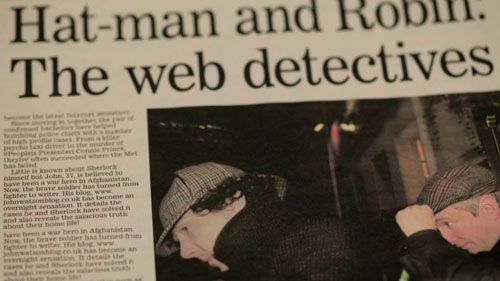
He would come to regret this choice of hat.
Moffat mentioned "one clue that everyone’s missed," which has to be that Sherlock took credit publicly for the cases at the beginning of the episode, which he never does (as established by the much-maligned hat he dons to dodge the paparazzi in A Scandal in Belgravia and confirmed by Many Happy Returns). Was this a ploy to raise his profile and draw Moriarty out? Maybe Mycroft tied some more cases to him and had Sherlock solve them. Could also have been Moriarty orchestrating some more high-profile cases (easy enough to make a painting disappear with his established ties to the art world in The Great Game) to raise Sherlock’s profile in the media. Either way, these appearances weren't something Sherlock made with any enthusiasm.
Why would having the press turn on Sherlock upset John? I don’t know, why should having people believe lies about someone you care for upset anyone at all, genius? Speaking of the news though, someone pointed out John’s passing mention of a Cabinet reshuffle story at the beginning of Hounds of Baskerville, at which point Moriarty was already in custody - can he manipulate government at that high a level to secure his release once he’d gotten everything he needed from Mycroft? It would explain his otherwise bewildering release.
Lovely scene in 221B with John (and his Hobbit-related shaved legs) reading a paper while a mannequin dangles behind him. “So, did you just talk to him for a really long time?” Hahaha, it’s like Ron Weasley making seemingly boneheaded and sarcastic comments and being totally right through the whole Harry Potter series - all Moriarty really did to take down Sherlock was talk to the right people. And then the foreshadowing in Sherlock’s reply: “Oh, Henry Fishguard never committed suicide.” Sherlock was researching a very old case of a man who faked his death (though at this point not in preparation for his own - he tells John “[Every case is] pressing till they’re solved,” so the satisfaction of solving what the Bow Street Runners couldn’t would be its own reward.)
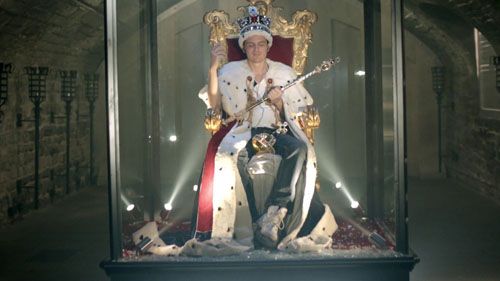
Such a BAMF.
Let’s just take a moment to appreciate the magnificent sequence of Moriarty’s three high profile break-ins: Lestrade’s “Not our division,” the banker spilling his tea, Moriarty dancing to the Thieving Magpie and drawing “Get Sherlock” in time with the music, the final shot of him on the throne. Beautifully done.
The concealed recorder concept - Sherlock throws away his phone on Bart’s roof because he kept Moriarty talking to reveal his plan and the lie of Richard Brook and either recorded it on his phone or used it as a hotspot to send the feed from the closed circuit camera he found in 221B to a nearby computer - is first brought up in the Old Bailey bathroom with Kitty Riley (who also introduces herself as something she’s not).
Ah, the publicity stunt trial, so perfect. Also, ask me about John’s utter unwillingness to validate the approval-seeking look Sherlock gives him after deducing the jury.
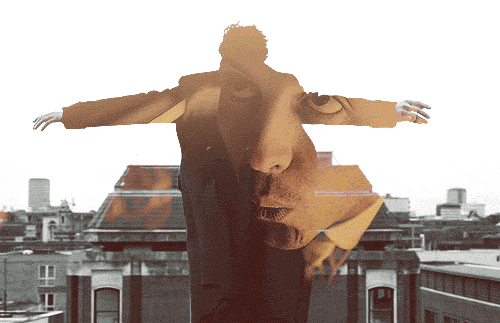
Amazing GIF is amazing.
During tea in 221B, Moriarty reveals he’s done playing: the events that will resolve their final problem will begin soon, and he will make good on his promise of a fall.
"We’re just alike, you and I, except you’re boring - you’re on the side of the angels.” Moriarty may mock Sherlock for collaborating with the police, but never asks him to join forces. Because without good, what is evil? Businessmen need partners; fairy tale villains need heroes, and Moriarty confesses fancying himself the latter.
hrhpod pointed out the lovely symbolic significance of the apple, specifically the fall of man and the discovery of gravity.
Moriarty asks for a demonstration of Sherlock’s skills, then uses it to plant his story about the code that could open any door. I love the choice of words, “I owe you a fall, Sherlock.” With his shocking acquittal and the rumors of an electronic skeleton key, Moriarty has come a long way from poisoning a classmate. So what does Moriarty “owe” Sherlock? Three Patch Podcast have an eloquent explanation: “‘IOU’ is about loneliness. It’s about friendship, about the bonds that give meaning to life. … It’s about John’s gain and Moriarty’s loss. … Moriarty’s desperation to reassert kinship with Sherlock … ring increasingly false. He tries to trivialize Sherlock’s friendship with John by saying he, too, should get himself ‘an ordinary one,’ as though the profane mockery of a relationship he perpetrates upon Kitty Riley bears any resemblance to love.” Before John, but even Mrs. Hudson and Lestrade, it may have been accurate to say, “You need me, or you’re nothing.” Now, though, Sherlock is just like a member of his kangaroo court: “Every person has their pressure point, someone they want to protect from harm.”
Finally, a shoutout for the mountain of work that went into this IOU crackpot theory that ties in chemistry and fairy tales. It’s a damn lot of fun (even Gatiss has read it!)
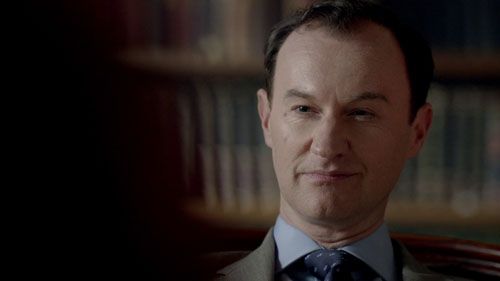
Mycroft Holmes’ bitchface is better than yours.
John and Mycroft’s conversation also sets up a few things: Mycroft, the man who IS the British government, reads tabloids? If he wanted to make a story disappear, there’s no doubt he could, but no, the exposé on the baby brother he worries about “constantly” will run as scheduled. He laughs off John’s suggestion that the source could be a friend of Sherlock’s, setting up John’s eventual realization that the information must’ve come from him - to head off John coming to him if he ever came to suspect Sherlock wasn’t dead.
Then Mycroft admonishes John’s observational skills for not recognizing that assassins had moved in next door to 221B. If they were Mycroft’s men, why point them out? No, they’re employed by Moriarty’s clients, who are hunting Sherlock because he has the keycode. Mycroft ends their chat by making himself seem like a petty man holding childhood grudges, and John connects the rest of the dots by assuming Sherlock won’t accept Mycroft’s help. Brilliantly played, Mycroft.

Dear me, Mr. Holmes, dear me.
A little background here: The brothers Holmes have had their eye on Moriarty since it was revealed he’d masterminded Irene Adler’s ploy to decode the flight of the dead in Scandal in Belgravia. She came into some dangerous information, and the consulting criminal came up with the perfect plan: play the Holmes brothers off each other to solve it, then blackmail them (financially and emotionally) into protecting you. Which all ties into what Moriarty got out of the deal (since he worked for free): Mycroft’s attention.
Love the fairy tale motif of this episode: breadcrumbs, the Grimm’s fairy tales book at the boarding school, glowing footprints as the gleaming white pebbles that Hansel left to lead them home, the poisoned chocolates, the burnt to a crisp gingerbread man.
“You’re a bit like my dad. He’s dead.” OH MOLLY.
Following that lovely moment is finding the kidnapped children and the little girl’s infamous scream at the hospital when she sees Sherlock (and John) walk in the room. Lots of theories about this, but my favorite is that Moriarty’s assassins at Bart’s and Scotland Yard respectively bear strong passing resemblances to Sherlock and John. She’s a traumatized witness, likely only saw them by the half light of the factory - it could work. As for the theory that Moriarty wore a mask of Sherlock to terrorize the kids, Sherlock told the gallery owner in The Great Game that “The art of disguise is knowing how to hide in plain sight,” and an elaborately crafted mask ala Mission: Impossible doesn’t really fit the bill. (Though on an interesting note, in The Adventure of the Yellow Face, a little girl’s identity is hidden with a mask, so it would be an interesting callback to have a little girl fooled by someone else in a mask here.)
“Don’t let it get to you, I always feel like screaming when you walk into a room.” OH LESTRADE. The fact that he can joke like that after pointing out something about Sherlock reminded the little girl of the kidnapper is lovely, really. The act of a really excellent friend to brush a thing like that off, even as Sally calls the coincidence “unbelievable.” Even though she’s technically right, it’s Lestrade who gets all the points for this scene.
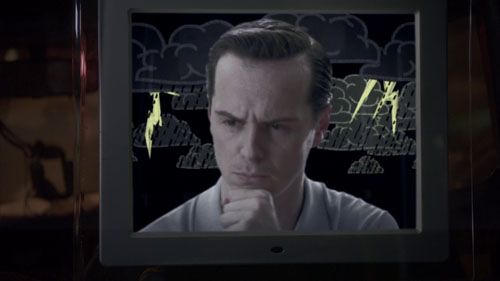
“Are Sir Boast-a-Lot’s stories even true?”
In the cab, the Sir Boast-a-Lot fairy tale that Moriarty tells Sherlock parallels the fall of Lucifer from Isaiah 14:9-17.
“Sir Boast-a-lot was the bravest and cleverest knight of the round table. But soon the other knights began to grow tired of his stories about how many dragons he’d slain. And soon they began to wonder: “Are Sir Boast-a-lot’s stories even true?” Ohhhh noooo. So all of the knights went to King Arthur and said “I don’t believe Sir Boast-a-lot’s stories! He’s just a big old liar who makes things up to make himself look good.” And then even the King began to wonder…”
King James version:
“How you are fallen from heaven,
O Lucifer, son of the morning!
How you are cut down to the ground,
You who weakened the nations!
For you have said in your heart:
‘I will ascend into heaven,
I will exalt my throne above the stars of God
[...] Yet you shall be brought down to Sheol,
To the lowest depths of the Pit.
Those who see you will gaze at you,
And consider you, saying:
‘Is this the man who made the earth tremble,
Who shook kingdoms…”
With that, I once again hand things over to the Three Patch ladies: “For Sherlock, who can barely bring himself to acknowledge that he has friends at all, enduring this knowledge requires a degree of growth so great that he must become almost not himself - another recurring concept in ‘Reichenbach.’ Sherlock must fall from being almost like an angel, above it all, unsusceptible to ordinary sentiment, to becoming just a man.”
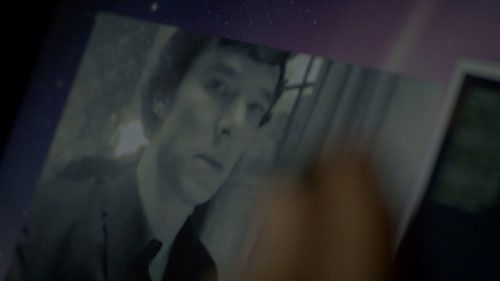
Somebody’s watching meeeee.
When the assassin is killed after shaking his hand, Sherlock figures out that they’re not planning to kill him but keep him alive. (What sort of criminal leaves clues? What sort of assassin saves lives? THIS EPISODE.) He takes the wi-fi networks to mean closed-circuit surveillance is being done, then finds the camera in 221B. (The assassin sent for Mrs. Hudson had fairly unrestricted access to all of 221, and was carrying a ladder into the building last we saw him.) What does Sherlock have that the assassins want? When he questions the man who saves him and John from the bus, he figures out that the keycode was left at 221B and ties the “Get Sherlock” message to the assassins moving in next door - “another subtle way of smearing my name” to have killers living in such convenient proximity.
Sherlock declines to go with Lestrade so he can be photographed as a suspect for the same reason, saying, “He wants to destroy me inch by inch. It is a game, Lestrade, and not one I’m willing to play.”
John gets so ANGRY that Sherlock doesn’t care about how people perceive him, and when Sherlock tries to start an argument John does essentially what Lestrade did by making a dismissive joke: “Nobody can fake being such an annoying dick all the time.” Which is, in its own way, the most affectionate thing John’s ever said to Sherlock, far moreso than the involuntary bursts of praise after his deductions. And then Sherlock’s small sad smile kills me a little.
The scene in Kitty Riley’s apartment (nice stencil on the wall, “make believe”) is one of my favorite of the series, from the squeaky door opening to reveal John and Sherlock on the sofa, everyone’s reactions as Moriarty enters, “Rich Brook: an actor Sherlock Holmes hired to be Moriarty … It’s capital, he’d have made a master villain,” the look Moriarty gives Sherlock when John and Kitty have their backs turned, “That is what you do to sell a big lie, you wrap it up in the truth to make it more palatable.”
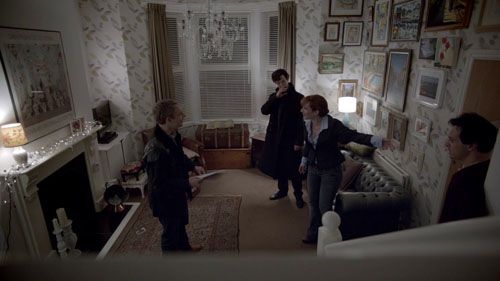
“Of course he’s Richard Brook, there is no Moriarty.”
Finally, we meet “Richard Brook,” a storyteller on children’s television and an ensemble actor in a television drama. Lovely touch that he’s an actor, in roles conveniently just minor enough that people likely wouldn’t recognize him out of costume, and we’ve established how hungry Kitty is for her first big scoop so the fact checking was likely lax at best. Funny thing is that Moriarty’s existence wasn’t any more real - Jefferson Hope is dead, the Black Lotus woman never saw his face if her Skype chat at the end of The Blind Banker is any indication, the gallery owner in The Great Game never met him. For all the criminal world knows, Moriarty could be anybody, or nobody.
Love that Molly’s only response to Sherlock in the lab as he babbles that he may not be everything she thinks is “What do you need?” Molly’s cooperation isn’t as simple as doing Sherlock a favor. This is knowledge that puts her in an incredibly dangerous position if anyone finds out the truth, but of course she doesn’t hesitate. Hope Mycroft spared some people to keep an eye on her afterward.
As much as John is angry on behalf of his friend when he confronts Mycroft, when after the weeks of “enhanced interrogation” that went nowhere Mycroft realizes he could get the world’s most dangerous criminal (his own words) to talk in exchange for a life story Sherlock likely won’t even find worth mentioning to his biographer, well. That seems like an easy trade. I’m sure Sherlock agreed, though neither likely had any idea what Moriarty would do with the information. I think Mycroft sincerely, bitterly rues that it’s all come to this, that with all his resources he couldn’t prevent it, but his “I’m sorry. Tell him, would you?” is meant for John, too.
I can’t say whether Mycroft knows what Sherlock is planning to do at this point, since he’s not essential to any part of the actual fall (that’s down to Molly and the Homeless Network.) But the aftermath - a safehouse, money, probably falsified documents - is definitely Mycroft’s area and infinitely harder to come by without the skills of professionals. As much as I loved reading all the fics of Sherlock channeling James Bond as he shot, poisoned, smuggled and tortured his way across the world unraveling Moriarty’s spiderweb, it makes a lot more sense for someone with a lot more resources and manpower with actual MI6 training to do that while Sherlock stays “dead,” keeping both himself and his friends safe. In the original canon, Mycroft financed Sherlock’s clandestine life between his fall and his return (as well as keeping 221B just so - which would seem suspicious, but I guess it could be chalked up to grief.) This would indicate that our Mycroft would be the same.
Back at Bart’s, John’s nap is interrupted by the fake phone call that Mrs. Hudson’s been shot, an announcement that doesn’t so much as make Sherlock blink despite having “half-killed” the CIA agent who roughed her up in Scandal. (Interesting reference, this, since as Kadi points out this reminds the audience that we've already seen how a man can survive a fall (or several) through an upstairs window: land on the rubbish bins. In related news, one of my favorite GIFsets illustrates just how the first flipping act of this series’ first episode sets up everything in The Reichenbach Fall.)
And then: “Alone is what I have - alone protects me.”
“No, friends protect people.”
AJGHDSFGSDFH Sherlock asked John during their argument in The Great Game: “Does caring about [the victims] help save them?” This time, it does.
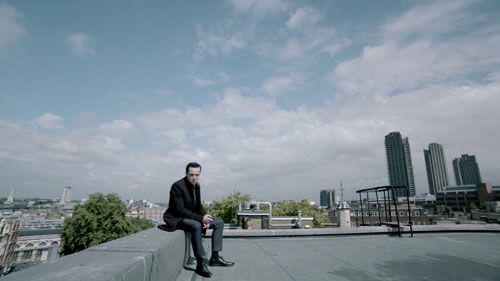
“We can try to understand The New York Times' effect on man.”
On the roof, Moriarty opens with his death wish: the final problem is that they’re “just staying [alive].” He’s beaten Sherlock, and now he’ll have to “go back to playing with ordinary people.”
The name that made, and very nearly unmade, Sherlock:
“Rich Brook in German is Reichen Bach, the case that made my name.”
“Just trying to have some fun.”
But besides performing his magic trick, Sherlock came up on the roof with some loose ends that needed tying up. Thing 1: figure out the computer code. Just as Sherlock explains Moriarty tapping it out on his knee during tea, Moriarty reveals that all his impressive break-ins had simply been daylight robberies with willing accomplices. “That’s your weakness, you always want everything to be clever.”
“I love newspapers - fairy tales. And pretty grim ones, too.” Who can beat a villain who likes puns and has a flare for the dramatic?
Thing 2: how will Moriarty force Sherlock to jump? “Three bullets, three gunmen, three victims. There is no stopping them now unless my people see you jump.” When it became clear that Moriarty wasn’t just content to kill Sherlock but intended to discredit him, too, it became clear that his suicide was to be part of the final problem. Sherlock had to provide the final proof that Kitty Riley’s story was real by killing himself out of guilt and shame. But he’s right: “I don’t have to die, if I’ve got you.”
“Sherlock, your big brother and all the king’s horses couldn’t make me do a thing I didn’t want to.” Great reference to another legendary fall, Humpty Dumpty.
Thing 3: Moriarty must die, but not by Sherlock’s hand, which would lend credence to Brook’s claim that he committed murders only to “investigate” them. “Yes, but I’m not my brother, remember? I am you: prepared to do anything, prepared to burn, prepared to do what ordinary people won’t do.” Until this moment, Sherlock completely rejected any notion that he and Moriarty were alike. Moriarty’s weakness is that he wants to believe, and when Sherlock says he might be on the side of the angels but not one of them, Moriarty gets the confirmation he sought that they are indeed equals: He may have bested Sherlock right up to the last minute (just as Irene Adler did) but in the end Sherlock found a way to make sure they went down together. “You’re me,” Moriarty says (a final wish that he may still see granted, in a way, if part of Sherlock’s big ask of Molly was to collect Moriarty’s corpse from the roof and pass it off as him, potentially to be buried in his grave.)
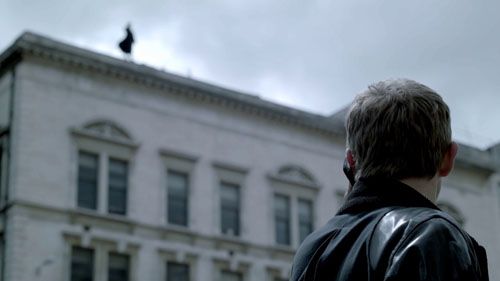
“We’ll just have to do it like this.”
The call to John had practical reasons, but it was personal, too. John needed to stay behind the building that would hide Sherlock’s landing. Sherlock needed to discredit himself to John, and everyone they know, so they wouldn’t go digging for the truth about his suicide. “Nobody could be that clever,” to which John replies without hesitation, “You could” - I cannot at all with Sherlock’s sob after that line. And then the bit of truth wrapped up in his big lie: “It’s a trick, just a magic trick.”
…
Right, now the ugly sobbing’s out of the way, time for the fall. Yael Moise pointed out that, in fact, Moffat and Gatiss have already dealt with the topic of how to fake one’s own death: “According to the P.I. in ‘Jekyll,’ a previous Moffat/Gatiss revival of an old Victorian classic: ‘To fake a death properly you need limitless funds, friends in high places, and a spare corpse.’” So, Mycroft, Molly and Moriarty (though not in that order).
Just after Moriarty shoots himself, Sherlock forces himself to hyperventilate in a technique for holding your breath longer (deep inhales and harsh exhales temporarily expand your lung capacity). This would’ve helped him feign death on the pavement.
Speaking of which: Whatever else about John’s unreliable perspective can be called into question, there’s no doubt that Sherlock jumped off Bart’s roof, and it was his body on the pavement. Why would he go to all the trouble of surviving the fall and then risk putting a decoy in his place and have John possibly not disoriented enough to think it’s him? The mannequin in the noose at 221B was too obviously fake, and there’s no guarantee it would remain intact after being dropped from any height. Sure, Molly has access to dead bodies, but passing one off as newly dead would be difficult even if the person you were trying to fool wasn’t a doctor. And the only thing riskier than a random corpse would be that of someone John knew. (I don’t doubt that he’s dead, and his body will likely serve the purpose of standing in for Sherlock, but not here.)
And if it’s not Sherlock, why show him playing with the rubber ball earlier in the lab? This is a magician’s technique to make it seem like you have no pulse - putting the ball under your armpit cuts off circulation to the major vein in your arm, making the pulse in your wrist disappear. A magic trick indeed.
The double-decker buses we see when Moriarty calls our attention to Sherlock’s “audience” weren’t moving - a man walks by and taps his cane on the door of one but it doesn’t open. Great way to ensure lines of sight are blocked and the parking spots are kept free for the incoming laundry truck. The Homeless Network operatives on the sidewalk see Sherlock step up on the ledge and begin preparations.
Sherlock’s phone is left behind so that at it can’t be traced via GPS once Sherlock is on the move (and possibly to be collected by Molly if it was used as a hotspot for the surveillance camera.)
The waiting laundry/rubbish truck below cushioned his landing, and as Imentory noted, that particular make and model has side flaps that open, allowing Sherlock roll right out onto the pavement. This also explains why Sherlock jumped perpendicular to the building, but landed parallel.
The cyclist knocks John down both to buy some time to set up the scene and, likely, concuss him a little to muddle his perception. I know we all love the rhododendron ponticum shoutout during Sherlock’s warehouse deduction, but between the concussion and the shock of seeing Sherlock jump, dosing John with a mind-altering substance to make him believe Sherlock is dead seems like overkill. Meanwhile, Sherlock should probably be sober for talking his archenemy into offing himself then jumping from a tall building. But we had mind-altering substances in both Scandal and Hounds, so it almost seems like a missing element here.
Once Sherlock was on the ground, it’s only a matter of carefully orchestrating his Homeless Network bystanders to:
1. Stage the blood on the pavement.
2. Keep John as far away as they could.
3. Have one of them check the pulse at his throat, forcing John to check his wrist.
4. Help get him onto the gurney and off the scene as quickly as possible.
Molly could’ve drawn/supplied the blood, then fakes the ID of Sherlock’s “body,” the autopsy and the death certificate, then secrets him out of the morgue (maybe even lets him stay in her apartment as a temporary safehouse). More immediately, she got the medical team in place to whisk Sherlock away, then render any necessary first aid (soft landing or not, a jump like that still carries risks). She could even clear Moriarty’s body off the roof (and maybe mangle his face to pass him off as Sherlock, ala Irene, to bury in his grave?) so that news of his death wouldn’t reach his network (Mycroft’s paper at the end doesn’t seem to mention him), which could unravel or, worse, seek vengeance. How neat would it be if Mycroft then took on the role of Moriarty to lure out his accomplices?
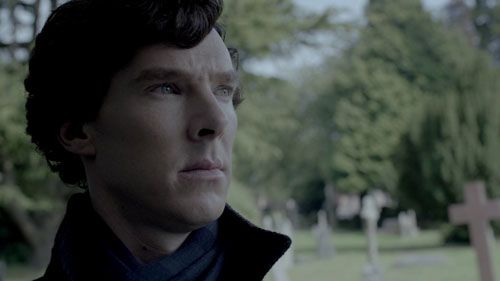
The reports of my death have been greatly exaggerated.
In closing, Keith Topping ruminated eloquently on the episode, including Andrew Scott’s acting and the modern media’s power to “create and then destroy reputations on a whim.” But the point that will resonate with anyone who’s seen the trailer for The Empty Hearse, was this: “We get a moral dilemma from which the only, apparent, way out is an act of pure self-sacrifice. Which, for a narcissist like Sherlock Holmes might be regarded as something to be looked forward to rather than avoided.” Oy.
BONUS: Jeremy Lovering, director of The Empty Hearse, admitted that some sequences we saw being filmed for the episode were fake scenes. I’m going with friend of the show Derren Brown hypnotizing John and setting his watch back an hour and Moriarty shaking hands with Mycroft while wearing Sherlock’s coat as being the obvious decoys. Because really, WTF?
As an aside, this post would be more thoroughly sourced if more than half of the links I’ve come across weren’t inactive due to people changing/deleting their Tumblr handles. Such a black hole of fannish history.
That doesn't mean I can't spend a few thousand words (>.>) tying up the loose ends.

He would come to regret this choice of hat.
Moffat mentioned "one clue that everyone’s missed," which has to be that Sherlock took credit publicly for the cases at the beginning of the episode, which he never does (as established by the much-maligned hat he dons to dodge the paparazzi in A Scandal in Belgravia and confirmed by Many Happy Returns). Was this a ploy to raise his profile and draw Moriarty out? Maybe Mycroft tied some more cases to him and had Sherlock solve them. Could also have been Moriarty orchestrating some more high-profile cases (easy enough to make a painting disappear with his established ties to the art world in The Great Game) to raise Sherlock’s profile in the media. Either way, these appearances weren't something Sherlock made with any enthusiasm.
Why would having the press turn on Sherlock upset John? I don’t know, why should having people believe lies about someone you care for upset anyone at all, genius? Speaking of the news though, someone pointed out John’s passing mention of a Cabinet reshuffle story at the beginning of Hounds of Baskerville, at which point Moriarty was already in custody - can he manipulate government at that high a level to secure his release once he’d gotten everything he needed from Mycroft? It would explain his otherwise bewildering release.
Lovely scene in 221B with John (and his Hobbit-related shaved legs) reading a paper while a mannequin dangles behind him. “So, did you just talk to him for a really long time?” Hahaha, it’s like Ron Weasley making seemingly boneheaded and sarcastic comments and being totally right through the whole Harry Potter series - all Moriarty really did to take down Sherlock was talk to the right people. And then the foreshadowing in Sherlock’s reply: “Oh, Henry Fishguard never committed suicide.” Sherlock was researching a very old case of a man who faked his death (though at this point not in preparation for his own - he tells John “[Every case is] pressing till they’re solved,” so the satisfaction of solving what the Bow Street Runners couldn’t would be its own reward.)

Such a BAMF.
Let’s just take a moment to appreciate the magnificent sequence of Moriarty’s three high profile break-ins: Lestrade’s “Not our division,” the banker spilling his tea, Moriarty dancing to the Thieving Magpie and drawing “Get Sherlock” in time with the music, the final shot of him on the throne. Beautifully done.
The concealed recorder concept - Sherlock throws away his phone on Bart’s roof because he kept Moriarty talking to reveal his plan and the lie of Richard Brook and either recorded it on his phone or used it as a hotspot to send the feed from the closed circuit camera he found in 221B to a nearby computer - is first brought up in the Old Bailey bathroom with Kitty Riley (who also introduces herself as something she’s not).
Ah, the publicity stunt trial, so perfect. Also, ask me about John’s utter unwillingness to validate the approval-seeking look Sherlock gives him after deducing the jury.

Amazing GIF is amazing.
During tea in 221B, Moriarty reveals he’s done playing: the events that will resolve their final problem will begin soon, and he will make good on his promise of a fall.

Mycroft Holmes’ bitchface is better than yours.
John and Mycroft’s conversation also sets up a few things: Mycroft, the man who IS the British government, reads tabloids? If he wanted to make a story disappear, there’s no doubt he could, but no, the exposé on the baby brother he worries about “constantly” will run as scheduled. He laughs off John’s suggestion that the source could be a friend of Sherlock’s, setting up John’s eventual realization that the information must’ve come from him - to head off John coming to him if he ever came to suspect Sherlock wasn’t dead.
Then Mycroft admonishes John’s observational skills for not recognizing that assassins had moved in next door to 221B. If they were Mycroft’s men, why point them out? No, they’re employed by Moriarty’s clients, who are hunting Sherlock because he has the keycode. Mycroft ends their chat by making himself seem like a petty man holding childhood grudges, and John connects the rest of the dots by assuming Sherlock won’t accept Mycroft’s help. Brilliantly played, Mycroft.

Dear me, Mr. Holmes, dear me.
A little background here: The brothers Holmes have had their eye on Moriarty since it was revealed he’d masterminded Irene Adler’s ploy to decode the flight of the dead in Scandal in Belgravia. She came into some dangerous information, and the consulting criminal came up with the perfect plan: play the Holmes brothers off each other to solve it, then blackmail them (financially and emotionally) into protecting you. Which all ties into what Moriarty got out of the deal (since he worked for free): Mycroft’s attention.
Love the fairy tale motif of this episode: breadcrumbs, the Grimm’s fairy tales book at the boarding school, glowing footprints as the gleaming white pebbles that Hansel left to lead them home, the poisoned chocolates, the burnt to a crisp gingerbread man.
“You’re a bit like my dad. He’s dead.” OH MOLLY.
Following that lovely moment is finding the kidnapped children and the little girl’s infamous scream at the hospital when she sees Sherlock (and John) walk in the room. Lots of theories about this, but my favorite is that Moriarty’s assassins at Bart’s and Scotland Yard respectively bear strong passing resemblances to Sherlock and John. She’s a traumatized witness, likely only saw them by the half light of the factory - it could work. As for the theory that Moriarty wore a mask of Sherlock to terrorize the kids, Sherlock told the gallery owner in The Great Game that “The art of disguise is knowing how to hide in plain sight,” and an elaborately crafted mask ala Mission: Impossible doesn’t really fit the bill. (Though on an interesting note, in The Adventure of the Yellow Face, a little girl’s identity is hidden with a mask, so it would be an interesting callback to have a little girl fooled by someone else in a mask here.)
“Don’t let it get to you, I always feel like screaming when you walk into a room.” OH LESTRADE. The fact that he can joke like that after pointing out something about Sherlock reminded the little girl of the kidnapper is lovely, really. The act of a really excellent friend to brush a thing like that off, even as Sally calls the coincidence “unbelievable.” Even though she’s technically right, it’s Lestrade who gets all the points for this scene.

“Are Sir Boast-a-Lot’s stories even true?”
In the cab, the Sir Boast-a-Lot fairy tale that Moriarty tells Sherlock parallels the fall of Lucifer from Isaiah 14:9-17.
“Sir Boast-a-lot was the bravest and cleverest knight of the round table. But soon the other knights began to grow tired of his stories about how many dragons he’d slain. And soon they began to wonder: “Are Sir Boast-a-lot’s stories even true?” Ohhhh noooo. So all of the knights went to King Arthur and said “I don’t believe Sir Boast-a-lot’s stories! He’s just a big old liar who makes things up to make himself look good.” And then even the King began to wonder…”
King James version:
“How you are fallen from heaven,
O Lucifer, son of the morning!
How you are cut down to the ground,
You who weakened the nations!
For you have said in your heart:
‘I will ascend into heaven,
I will exalt my throne above the stars of God
[...] Yet you shall be brought down to Sheol,
To the lowest depths of the Pit.
Those who see you will gaze at you,
And consider you, saying:
‘Is this the man who made the earth tremble,
Who shook kingdoms…”
With that, I once again hand things over to the Three Patch ladies: “For Sherlock, who can barely bring himself to acknowledge that he has friends at all, enduring this knowledge requires a degree of growth so great that he must become almost not himself - another recurring concept in ‘Reichenbach.’ Sherlock must fall from being almost like an angel, above it all, unsusceptible to ordinary sentiment, to becoming just a man.”

Somebody’s watching meeeee.
When the assassin is killed after shaking his hand, Sherlock figures out that they’re not planning to kill him but keep him alive. (What sort of criminal leaves clues? What sort of assassin saves lives? THIS EPISODE.) He takes the wi-fi networks to mean closed-circuit surveillance is being done, then finds the camera in 221B. (The assassin sent for Mrs. Hudson had fairly unrestricted access to all of 221, and was carrying a ladder into the building last we saw him.) What does Sherlock have that the assassins want? When he questions the man who saves him and John from the bus, he figures out that the keycode was left at 221B and ties the “Get Sherlock” message to the assassins moving in next door - “another subtle way of smearing my name” to have killers living in such convenient proximity.
Sherlock declines to go with Lestrade so he can be photographed as a suspect for the same reason, saying, “He wants to destroy me inch by inch. It is a game, Lestrade, and not one I’m willing to play.”
John gets so ANGRY that Sherlock doesn’t care about how people perceive him, and when Sherlock tries to start an argument John does essentially what Lestrade did by making a dismissive joke: “Nobody can fake being such an annoying dick all the time.” Which is, in its own way, the most affectionate thing John’s ever said to Sherlock, far moreso than the involuntary bursts of praise after his deductions. And then Sherlock’s small sad smile kills me a little.
The scene in Kitty Riley’s apartment (nice stencil on the wall, “make believe”) is one of my favorite of the series, from the squeaky door opening to reveal John and Sherlock on the sofa, everyone’s reactions as Moriarty enters, “Rich Brook: an actor Sherlock Holmes hired to be Moriarty … It’s capital, he’d have made a master villain,” the look Moriarty gives Sherlock when John and Kitty have their backs turned, “That is what you do to sell a big lie, you wrap it up in the truth to make it more palatable.”

“Of course he’s Richard Brook, there is no Moriarty.”
Finally, we meet “Richard Brook,” a storyteller on children’s television and an ensemble actor in a television drama. Lovely touch that he’s an actor, in roles conveniently just minor enough that people likely wouldn’t recognize him out of costume, and we’ve established how hungry Kitty is for her first big scoop so the fact checking was likely lax at best. Funny thing is that Moriarty’s existence wasn’t any more real - Jefferson Hope is dead, the Black Lotus woman never saw his face if her Skype chat at the end of The Blind Banker is any indication, the gallery owner in The Great Game never met him. For all the criminal world knows, Moriarty could be anybody, or nobody.
Love that Molly’s only response to Sherlock in the lab as he babbles that he may not be everything she thinks is “What do you need?” Molly’s cooperation isn’t as simple as doing Sherlock a favor. This is knowledge that puts her in an incredibly dangerous position if anyone finds out the truth, but of course she doesn’t hesitate. Hope Mycroft spared some people to keep an eye on her afterward.
As much as John is angry on behalf of his friend when he confronts Mycroft, when after the weeks of “enhanced interrogation” that went nowhere Mycroft realizes he could get the world’s most dangerous criminal (his own words) to talk in exchange for a life story Sherlock likely won’t even find worth mentioning to his biographer, well. That seems like an easy trade. I’m sure Sherlock agreed, though neither likely had any idea what Moriarty would do with the information. I think Mycroft sincerely, bitterly rues that it’s all come to this, that with all his resources he couldn’t prevent it, but his “I’m sorry. Tell him, would you?” is meant for John, too.
I can’t say whether Mycroft knows what Sherlock is planning to do at this point, since he’s not essential to any part of the actual fall (that’s down to Molly and the Homeless Network.) But the aftermath - a safehouse, money, probably falsified documents - is definitely Mycroft’s area and infinitely harder to come by without the skills of professionals. As much as I loved reading all the fics of Sherlock channeling James Bond as he shot, poisoned, smuggled and tortured his way across the world unraveling Moriarty’s spiderweb, it makes a lot more sense for someone with a lot more resources and manpower with actual MI6 training to do that while Sherlock stays “dead,” keeping both himself and his friends safe. In the original canon, Mycroft financed Sherlock’s clandestine life between his fall and his return (as well as keeping 221B just so - which would seem suspicious, but I guess it could be chalked up to grief.) This would indicate that our Mycroft would be the same.
Back at Bart’s, John’s nap is interrupted by the fake phone call that Mrs. Hudson’s been shot, an announcement that doesn’t so much as make Sherlock blink despite having “half-killed” the CIA agent who roughed her up in Scandal. (Interesting reference, this, since as Kadi points out this reminds the audience that we've already seen how a man can survive a fall (or several) through an upstairs window: land on the rubbish bins. In related news, one of my favorite GIFsets illustrates just how the first flipping act of this series’ first episode sets up everything in The Reichenbach Fall.)
And then: “Alone is what I have - alone protects me.”
“No, friends protect people.”
AJGHDSFGSDFH Sherlock asked John during their argument in The Great Game: “Does caring about [the victims] help save them?” This time, it does.

“We can try to understand The New York Times' effect on man.”
On the roof, Moriarty opens with his death wish: the final problem is that they’re “just staying [alive].” He’s beaten Sherlock, and now he’ll have to “go back to playing with ordinary people.”
The name that made, and very nearly unmade, Sherlock:
“Rich Brook in German is Reichen Bach, the case that made my name.”
“Just trying to have some fun.”
But besides performing his magic trick, Sherlock came up on the roof with some loose ends that needed tying up. Thing 1: figure out the computer code. Just as Sherlock explains Moriarty tapping it out on his knee during tea, Moriarty reveals that all his impressive break-ins had simply been daylight robberies with willing accomplices. “That’s your weakness, you always want everything to be clever.”
“I love newspapers - fairy tales. And pretty grim ones, too.” Who can beat a villain who likes puns and has a flare for the dramatic?
Thing 2: how will Moriarty force Sherlock to jump? “Three bullets, three gunmen, three victims. There is no stopping them now unless my people see you jump.” When it became clear that Moriarty wasn’t just content to kill Sherlock but intended to discredit him, too, it became clear that his suicide was to be part of the final problem. Sherlock had to provide the final proof that Kitty Riley’s story was real by killing himself out of guilt and shame. But he’s right: “I don’t have to die, if I’ve got you.”
“Sherlock, your big brother and all the king’s horses couldn’t make me do a thing I didn’t want to.” Great reference to another legendary fall, Humpty Dumpty.
Thing 3: Moriarty must die, but not by Sherlock’s hand, which would lend credence to Brook’s claim that he committed murders only to “investigate” them. “Yes, but I’m not my brother, remember? I am you: prepared to do anything, prepared to burn, prepared to do what ordinary people won’t do.” Until this moment, Sherlock completely rejected any notion that he and Moriarty were alike. Moriarty’s weakness is that he wants to believe, and when Sherlock says he might be on the side of the angels but not one of them, Moriarty gets the confirmation he sought that they are indeed equals: He may have bested Sherlock right up to the last minute (just as Irene Adler did) but in the end Sherlock found a way to make sure they went down together. “You’re me,” Moriarty says (a final wish that he may still see granted, in a way, if part of Sherlock’s big ask of Molly was to collect Moriarty’s corpse from the roof and pass it off as him, potentially to be buried in his grave.)

“We’ll just have to do it like this.”
The call to John had practical reasons, but it was personal, too. John needed to stay behind the building that would hide Sherlock’s landing. Sherlock needed to discredit himself to John, and everyone they know, so they wouldn’t go digging for the truth about his suicide. “Nobody could be that clever,” to which John replies without hesitation, “You could” - I cannot at all with Sherlock’s sob after that line. And then the bit of truth wrapped up in his big lie: “It’s a trick, just a magic trick.”
…
Right, now the ugly sobbing’s out of the way, time for the fall. Yael Moise pointed out that, in fact, Moffat and Gatiss have already dealt with the topic of how to fake one’s own death: “According to the P.I. in ‘Jekyll,’ a previous Moffat/Gatiss revival of an old Victorian classic: ‘To fake a death properly you need limitless funds, friends in high places, and a spare corpse.’” So, Mycroft, Molly and Moriarty (though not in that order).
Speaking of which: Whatever else about John’s unreliable perspective can be called into question, there’s no doubt that Sherlock jumped off Bart’s roof, and it was his body on the pavement. Why would he go to all the trouble of surviving the fall and then risk putting a decoy in his place and have John possibly not disoriented enough to think it’s him? The mannequin in the noose at 221B was too obviously fake, and there’s no guarantee it would remain intact after being dropped from any height. Sure, Molly has access to dead bodies, but passing one off as newly dead would be difficult even if the person you were trying to fool wasn’t a doctor. And the only thing riskier than a random corpse would be that of someone John knew. (I don’t doubt that he’s dead, and his body will likely serve the purpose of standing in for Sherlock, but not here.)
And if it’s not Sherlock, why show him playing with the rubber ball earlier in the lab? This is a magician’s technique to make it seem like you have no pulse - putting the ball under your armpit cuts off circulation to the major vein in your arm, making the pulse in your wrist disappear. A magic trick indeed.
1. Stage the blood on the pavement.
2. Keep John as far away as they could.
3. Have one of them check the pulse at his throat, forcing John to check his wrist.
4. Help get him onto the gurney and off the scene as quickly as possible.

The reports of my death have been greatly exaggerated.
In closing, Keith Topping ruminated eloquently on the episode, including Andrew Scott’s acting and the modern media’s power to “create and then destroy reputations on a whim.” But the point that will resonate with anyone who’s seen the trailer for The Empty Hearse, was this: “We get a moral dilemma from which the only, apparent, way out is an act of pure self-sacrifice. Which, for a narcissist like Sherlock Holmes might be regarded as something to be looked forward to rather than avoided.” Oy.
BONUS: Jeremy Lovering, director of The Empty Hearse, admitted that some sequences we saw being filmed for the episode were fake scenes. I’m going with friend of the show Derren Brown hypnotizing John and setting his watch back an hour and Moriarty shaking hands with Mycroft while wearing Sherlock’s coat as being the obvious decoys. Because really, WTF?
As an aside, this post would be more thoroughly sourced if more than half of the links I’ve come across weren’t inactive due to people changing/deleting their Tumblr handles. Such a black hole of fannish history.